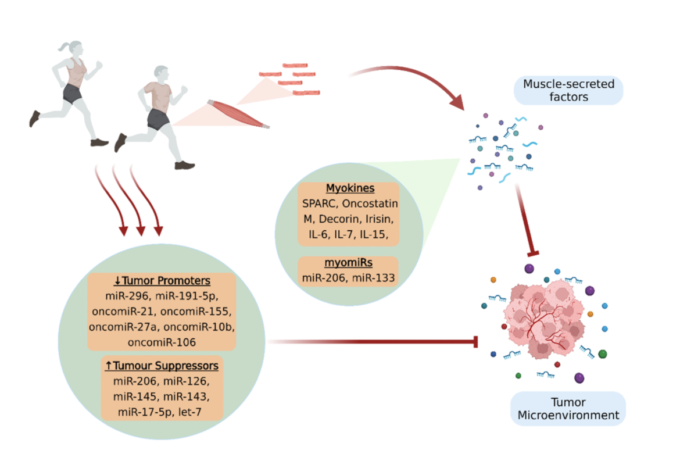Anatomy, Articles, Healthcare Providers, In the Press, Resources, Yoga Medicine® News
The Benefits of Skeletal Muscle for Cancer Prevention & Survival
By Dr. Doreen Wiggins for Yoga Medicine®.

Yoga, aerobic, and resistance exercise are routinely recommended for cancer survivors to improve quality of life, lessen the side effects of treatment and disease, and improve survival. Much of the health benefit has been attributed to better cardiovascular health, mobility and flexibility, improved conditioning, and a decrease in adipose tissue. Research has shown that engaging in exercise and muscular activity during cancer treatment and survivorship can reduce the risk of cachexia (muscle loss/wasting), and improve quality of life, and survival. Could a significant health benefit for cancer survival be derived from the movement of the skeletal muscle itself during exercise? Can skeletal muscle activity decrease the risk of cancer, or improve survival if you have cancer?
Moving the body, yoga, and strength conditioning directly enhance skeletal muscle mass and function. In response to muscular contraction, skeletal muscle cells produce and release myokines. Myokines are the cytokines of muscles, small cell signaling proteins, and peptides, skeletal “messengers” that have the capacity to transmit humoral factors: hormones, and immune modulators into the circulation with exercise. Myokines do not only act within the muscle but also affect distant organs and bodily systems as mediators of communication. Myokines activate molecular interactions and pathways between the contracting muscles and the entire body, exerting benefits to decrease chronic inflammation, oxidative stress, and metabolic disorders. These same myokines, like bundles of joy, have the ability to cross the blood-brain barrier to create positive changes in mood and sense of well-being in response to exercise.
Recent science reveals novel insight into how exercise can prevent cancer from occurring, and improve survival, mediated directly by the myokines that are released from muscle with movement and stretching. Myokines, much like a search and rescue mission, seek and find tumor microenvironments to reduce the proliferation of cancer cells, induce tumor cell apoptosis (cell death), and decrease inflammation to reduce the risk of metastatic disease. They also directly signal the mobilization of immune cells such as Natural Killer (NK) Cells to restrict tumor growth.
The past 20 years of observational studies clearly demonstrate that exercise can help prevent cancer, and improve survival for individuals with cancers with little understanding of the impact and benefit held within skeletal muscle. Recent research has opened a new wonder of insight and optimism of how skeletal muscle movement and engagement offer a nonpharmacologic holistic approach to preventing cancer and improving survival.
References:
- Papadopetraki A, Maridaki M, Zagouri F, Dimopoulos MA, Koutsilieris M, Philippou A. Physical Exercise Restrains Cancer Progression through Muscle-Derived Factors. Cancers (Basel). 2022 Apr 8;14(8):1892. doi: 10.3390/cancers14081892. PMID: 35454797; PMCID: PMC9024747.
- Qianrui Huang, Mengling Wu, Xuyi Wu, Yiwen Zhang, Yong Xia, Muscle-to-tumor crosstalk: The effect of exercise-induced myokine on cancer progression, Biochimica et Biophysica Acta (BBA) – Reviews on Cancer,Volume 1877, Issue 5,2022,188761, ISSN 0304-419X,https://doi.org/10.1016/j.bbcan.2022.188761.













Hi Elizabeth
I agree we need more clinical outcome trials, if you go to the papers referenced, there is robust bench research promoting exercise benefits for cancer prevention and changing the micro environment to prevent metastasis. We do know sarcopenia is related to poor outcomes. Research is evolving, and exciting to offer no pharmaceutical agency.
None of the authors in the references are identified as doctors. The ideas are interesting but I would like to see better documentation
Hi Elizabeth
I agree we need more clinical outcome trials, if you go to the papers referenced, there is robust bench research promoting exercise benefits for cancer prevention and changing the micro environment to prevent metastasis. We do know sarcopenia is related to poor outcomes. Research is evolving, and exciting to offer no pharmaceutical agency.